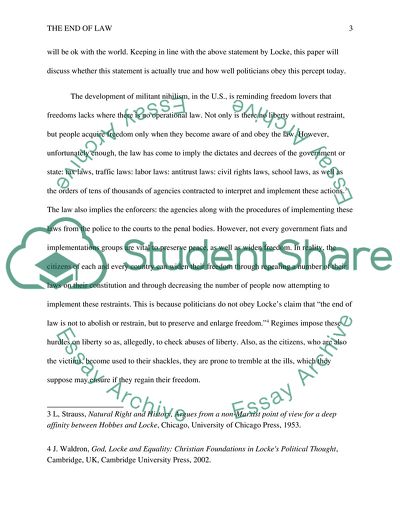Cite this document
(The Main Reason of Law Essay Example | Topics and Well Written Essays - 1750 words, n.d.)
The Main Reason of Law Essay Example | Topics and Well Written Essays - 1750 words. https://studentshare.org/law/1863003-the-end-of-law-is-not-to-abolish-or-restrain-but-to-preserve-and-enlarge-freedom-john-locke-university-of-oxford-is-this-true-how-well-do-politicians-obey-this-precept-today
The Main Reason of Law Essay Example | Topics and Well Written Essays - 1750 words. https://studentshare.org/law/1863003-the-end-of-law-is-not-to-abolish-or-restrain-but-to-preserve-and-enlarge-freedom-john-locke-university-of-oxford-is-this-true-how-well-do-politicians-obey-this-precept-today
(The Main Reason of Law Essay Example | Topics and Well Written Essays - 1750 Words)
The Main Reason of Law Essay Example | Topics and Well Written Essays - 1750 Words. https://studentshare.org/law/1863003-the-end-of-law-is-not-to-abolish-or-restrain-but-to-preserve-and-enlarge-freedom-john-locke-university-of-oxford-is-this-true-how-well-do-politicians-obey-this-precept-today.
The Main Reason of Law Essay Example | Topics and Well Written Essays - 1750 Words. https://studentshare.org/law/1863003-the-end-of-law-is-not-to-abolish-or-restrain-but-to-preserve-and-enlarge-freedom-john-locke-university-of-oxford-is-this-true-how-well-do-politicians-obey-this-precept-today.
“The Main Reason of Law Essay Example | Topics and Well Written Essays - 1750 Words”. https://studentshare.org/law/1863003-the-end-of-law-is-not-to-abolish-or-restrain-but-to-preserve-and-enlarge-freedom-john-locke-university-of-oxford-is-this-true-how-well-do-politicians-obey-this-precept-today.


